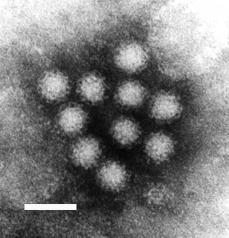You May Want to Avoid the Norovirus
 While you may be trying to protect yourself from the Flu, or even recuperating from it, there’s another group of highly contagious viruses we should be aware of: Noroviruses. While the name may sound a bit scary, we are actually very familiar with these viruses and chances are that you’ve come across a form on the Norovirus in your life; maybe even more than once. We know them as the stomach flu or food poisoning.
While you may be trying to protect yourself from the Flu, or even recuperating from it, there’s another group of highly contagious viruses we should be aware of: Noroviruses. While the name may sound a bit scary, we are actually very familiar with these viruses and chances are that you’ve come across a form on the Norovirus in your life; maybe even more than once. We know them as the stomach flu or food poisoning.
Norovirus, sometimes known as Norwalk virus or winter vomiting disease, is characterized by nausea, forceful vomiting, watery diarrhea, and abdominal pain, and in some cases, loss of taste. General lethargy, weakness, muscle aches, headache, coughs, and low-grade fever may occur or that someone-just-hit-me-with-a-plank feeling. The disease is usually self-limiting, and severe illness is rare. A small number of people die, mostly the very young, the elderly, and persons with weakened immune systems.
In the United States, Noroviruses are the most common cause of gastroenterisis, the inflammation of the stomach and intestines that cause stomach cramping, vomiting, and diarrhea. The CDC estimates that each year more than 20 million cases of acute gastroenteritis are caused by noroviruses. That means about 1 in every 15 Americans will get a norovirus illness each year. Norovirus is also estimated to cause over 70,000 hospitalizations and 800 deaths each year in the United States alone! Recent reports have also shown a high number of Norovirus cases worldwide.
There are many strains and no vaccination or treatment for noroviruses.
Federal health officials say a new strain, called the Sydney strain, is now causing most of the misery across the United States and the world.
Since there is no known method of treatment, it might be in your best interest to take more measures to prevent yourself from contracting the norovirus in the first place. Noroviruses are transmitted directly from person to person and indirectly via contaminated water and food. They are highly contagious, and fewer than twenty virus particles can cause an infection. Transmission occurs through ingesting contaminated food and water and by person-to-person spread.
Remember this next time you go to a restaurant to eat. Most restaurant workers don’t get paid sick leave, so if they miss work, they don’t get paid. This means many workers come in sick, and they can spread the virus to hundreds of customers. Food handlers, dishwashers, even staff who bus and clear tables, all can spread the germ.
If you do get sick, you simply have to let the virus run its course. Symptoms usually last 1 to 2 days. Treatment is designed to prevent dehydration. Pedialyte for infants and young children, and sport drinks for older children and adults can be used at home to maintain hydration. Because vomiting is a prominent symptom, these fluids are best administered in small volumes (3-5 oz) frequently (every 20-30 minutes) while awake. Close attention should be paid to urine output during the course of the illness. Individuals who cannot tolerate oral fluids, maintain urine output, or become lethargic or poorly arousable should be seen by a healthcare provider.
There are ways, however, to prevent yourself and loved ones from having to deal with this uncomfortable illness.
- Make hygiene a priority and wash your hands frequently, especially after using the bathroom, changing diapers, and before eating and preparing food.
- Be sure to wash your fruits and veggies and cook your food thoroughly.
- If you are sick, try not to spread the virus. This virus can spread quickly especially in crowded places. Clean and disinfect areas, wash your laundry thoroughly, and do not prepare food for others.
Being sick, especially with norovirus, is never pleasant. Take extra steps now to prevent yourself from contacting this virus. Remember, hygiene and disinfection is they key in preventing Norovirus!

